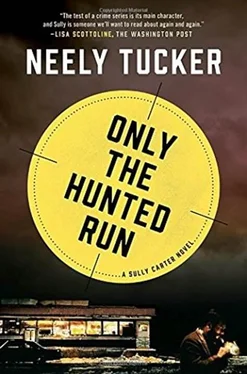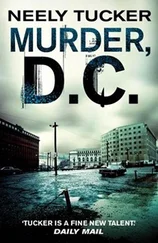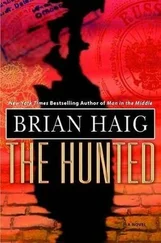Leo looked at him, then went back to staring at his hand.
“Why’d they come up with these things?” he replied, wagging a knobby little Nokia in his left hand, never lifting his shoulder from the wall. “It’s just another way for the ex to find me, is what it is. Wants to know, on a Friday morning in August, why our kids are going back to public school this year if I’m a lawyer. Says I have to be the only lawyer on the Hill whose kids are at Watkins. I say, nah, no, Jim Stevens, he’s got his kids there, and she says to me, she says, ‘I mean white people.’ When did my ex turn into a racist lunatic, that’s what I want to hear.”
“Our boy’s not up anytime soon is he?”
“How she gets a call in down here, I can’t get a call out .”
“I’m guessing we’re not even close.”
“What, Waters? You’re here for Waters? Grab a seat if you can, hotshot. Slummers were here at sunup.”
The double doors swung open, some TV suit from New York coming out, walking fast, heading to do a stand-up out front. Sully tapped Leo’s shoulder, adios, and slipped into the sanctuary before the door could close.
The room had the fluorescent look and feel of a tuberculosis ward, a dark, phlegmy, cough and passed-gas rectangle of a courtroom dungeon. It was accessed by the double doors behind him if you were a civilian and by the Door to Hell, the locked door at the back right side of the well of the court, if you were coming from the holding cells. There were a handful of long wooden benches for observers, like pews, hence the room’s designation as The Church. A central aisle led into the well of the court, with the magistrate on an elevated platform, lording over the proceedings.
The benches on most days were not more than scattershot full. They held the rear ends and crossed legs of dead-tired mothers and aunts and sisters and cousins, of exasperated fathers and pissed-off uncles, the bouncing bottoms of toddlers brought in to sit this out till Daddy or Mama’s man came through his presentation to the court, him and a hundred other lunkheads, the tots there because there wasn’t money for a sitter, or the time to find one, or that cousin who sometimes watched the kid was across town when Daddy got popped for a bullshit traffic stop, a handgun and a dime bag beneath the seat. So the babies bounced, chomping down on pacifiers and wiggling across the seats, the only people in the room oblivious to the slow-motion train wreck of humanity on the other side of the bulletproof glass.
This-thrown in with the court-appointed lawyers and the remora-like reporters, the bored-ass assistant U.S. attorney detailed here for the day, the magistrate, the marshals up front, everybody baking, the air assaulting one’s nostrils if not one’s sense of decency-was Sully Carter’s world.
It was the bargain-basement realm of the criminal justice planet, the justice-by-mass-discount world of the black and brown and every now and then, at least in D.C., some random white dude, almost always picked up for solicitation or something to do with sex and, what do you know, today his perp, the one and only Native American. Terry Waters was the reason television trucks were lining the street outside, their antennae spiraling up into the stagnant heat, cameramen in shorts and T-shirts, sitting on the shaded side of the vehicles. It wasn’t even noon, still hours before Waters would have his five-minute hearing, and the room already smelled of stale sweat, of the loss of hope, of desperation, of a three-year bid against a twelve-year charge.
He came around the back right of the room, behind the pews, catching the eye of Keith, sitting next to Dave, the WCJT reporter, both far off to the left. They raised eyebrows at him in recognition, but their bench was packed, nowhere for him to slide in. He parked himself on the front bench, marked LAWYERS ONLY. The U.S. marshal in the well of the court, who knew him and knew he wasn’t a lawyer, gave him a bored glance, stifled a yawn behind a closed fist, and turned away.
***
By the time Waters finally emerged from the Door to Hell, six hours had passed.
The reporters packing the room had gone from a well-heeled group of professionals to a sweaty mob who had already filled out the Times crossword puzzle (with help from the entire bench they were on), studied the box scores until they had them memorized, stepped out to the bathroom, made a coffee run, made a sandwich run, made an I-can’t-take-this-shit-anymore run. They did deep knee bends by the escalators, beating back the nodding-head monster of drowsiness. They called their editors and their spouses from the hallway, wandered over to the cafeteria, were asked to pipe down by the deputy clerk, were reminded that they could not bring food or drink into the spectators’ gallery. One of their tribe, an Australian television reporter, was booted from the room after approaching the well of the court for the third time and asking Magistrate Raymond Estes, who was not having the best day of his life, exactly how much fucking longer could it possibly take to bring forward the one defendant anyone was there to see. Scattered applause followed him out the door.
Sully had been over to hobnob with Dave and his WCJT crew, stepped outside to call Josh and Alexis twice, and now, late in the day, everybody musky and irritable, looked up from his paper to see Janice Miller, the head of the Public Defender Service, emerge from the Door to Hell, make her way around the tables and chairs in the well of the court, and slide in next to him.
“You’re not a lawyer, mister,” she whispered in his ear, smelling of expensive perfume, coffee heavy on her breath.
“You ain’t much a one,” Sully whispered back.
Janice-she pronounced it Jah-niece -tucked her chin down and grinned, squeezed his hand and let go, easygoing, even today. Born and raised in the Five Points neighborhood in Denver. Full-ride scholarship to USC Law. She could ski double-black diamonds and then call in from the bottom of the slope to tell twenty-four-year-old fuckups-who were now having second thoughts about the plea deal she’d spent weeks negotiating-that they’d sign the papers in front of them or she’d cut them off from agency representation and they’d spend the next thirty in a federal pen wishing they goddamn well had listened to her. But, hey, she’d tell them, it’s up to you. Totally up to you.
“What’s been the deal,” Sully whispered, “I mean, I know-”
“Floridly psychotic,” Janice nodded, tilting her head toward the Door to Hell. “Our boy is florid . Can’t get anything out of him for an hour, and then he’ll spout about radio transmissions in his molars.”
“Come on. I talked to him. He was, like, regular.”
Janice held her right hand up, as if taking the oath.
“Can I use it?” Sully asked.
“Just state it as a fact, not sourced to me. This is going to be a problem.”
“How you mean?”
“The state, they’re going to want to force him to take medication.”
“To make him sane enough to stand trial,” Sully whispered back, shrugging.
She grimaced and shook her head, long brown hair, coming to rest on her shoulders. “Not happening.”
“ Pero por qué, muchacha? ”
She looked over at him, bemused, slightly put off that he hadn’t thought this through. Now her face was turning tutorial, the eyes expanding, the mouth elongating, talking to the slowest student in her Georgetown Law seminar. “The man is charged with killing ten people in the U.S. Capitol, four of them officers, one of them a woman,” she whispered. “Does that sound like a capital offense?”
“I thought it was nine dead.”
“One of the criticals died this morning, two hours ago.”
Читать дальше








![Джон Макдональд - The Hunted [Short Story]](/books/433679/dzhon-makdonald-the-hunted-short-story-thumb.webp)



